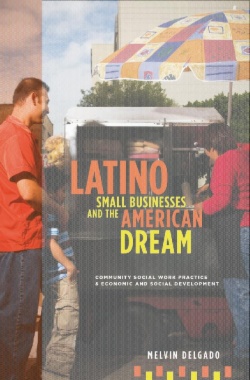Latino small businesses provide social, economic, and cultural comfort to their communities. They are also excellent facilitators of community capacity—a major component of effective social work practice. Social work practitioners have a vested interest in seeing such businesses grow, not only among Latinos but all communities of color. Reviewing the latest research on formal and informal economies within urban communities of color, Melvin Delgado lays out the demographic foundations for a richer collaboration between theory and practice.
Delgado deploys numerous case studies to cement the link between indigenous small businesses and community well-being. Whether regulated or unregulated, these establishments hire from within and promote immigrant self-employment. Latino small businesses often provide jobs for those whose criminal and mental health backgrounds intimidate conventional businesses. Recently estimated to be the largest group of color running small businesses in the United States, Latino owners top two million, with the number expected to double within the next few years. Joining an understanding of these institutions with the kind of practice that enables their social and economic improvement, Delgado explains how to identify and mobilize the kinds of resources that best spur their development.
- CONTENTS
- PREFACE
- PART 1 SETTING THE CONTEXT FOR SMALL BUSINESSES IN THE UNITED STATES
- 1 INTRODUCTION
- 2 LATINO DEMOGRAPHICS AND GEOGRAPHIC DISPERSAL
- 3 RACIAL AND ETHNIC SMALL BUSINESSES IN THE UNITED STATES
- 4 LATINO SMALL BUSINESSES AND COMMUNITY ECONOMIC DEVELOPMENT
- PART 2 COMMUNITY SOCIAL WORK VALUES AND ANALYTICAL FRAMEWORK
- 5 VALUES, PRINCIPLES, AND ANALYTICAL FRAMEWORK
- 6 INDICATORS OF SUCCESS FOR LATINO SMALL BUSINESSES
- 7 IMPLICATIONS FOR THE SOCIAL WORK PROFESSION
- EPILOGUE
- REFERENCES
- INDEX

